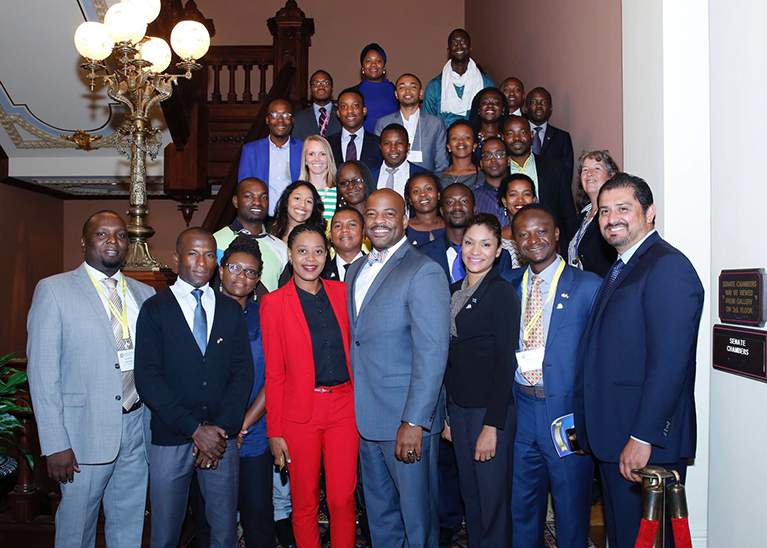Young African leaders who are leading by example
The Mandela Washington Fellowship for Young African Leaders is not just the name of a program—it is the continuation of Nelson Mandela’s legacy of leadership, peace, and service.
For the 1,000 young African leaders participating in the 2016 Mandela Washington Fellowship, being part of that legacy drives them to make a difference in their communities.

Leading by example to create positive change
In her home country of Liberia, Sydell Goll provides psycho-social counseling and educational activities for Ebola survivors and refugee children.
To complete the Fellowship, Goll is leaving her three-month-old child in her mother’s care. Goll believes she is following Mandela’s legacy of leading by example. Many other women must also briefly leave their children to participate in the Fellowship, but it is something they are willing to do to achieve their goals.
“I believe that I am a living story for [young girls],” Goll said. “Every girl should be given the opportunity to realize her dreams.”
Mandela’s vision of leading by example is also inspiring for Hamid Khayar of Chad. He hopes to advance this vision through his work as an IT research assistant at the National Research for Development Center and as a volunteer lecturer at the University of N’Djamena.
“I joined [the] university with the main purpose of helping other young people learn the lessons I benefited from,” said Khayar. “I hope to help contribute to…an informed and interconnected youth that learn and share ideas with people all over the world.”
Exercising servant leadership in communities
Beatrice Muthoni Ngugi believes in Mandela’s commitment to giving back to others—a theme reflected in her work in Kenya, where she develops hydro and solar power projects for small-scale tea farmers.
“Improving the livelihoods of all should be the mantra for all leaders,” said Ngugi. “Collectively, we [can] make this world a better place for ourselves and for generations to come.”
For Nhlahla Basil Mabasa from South Africa, Mandela’s legacy of servant leadership couldn’t touch closer to home. In 2011, he founded a cancer foundation in honor of his late mother to provide information on cancer, refer possible cancer cases to local hospitals, and offer support to patients. He hopes to create mobile cancer units that will travel from community to community.
“The greatest lesson I can learn from Mandela is he put the needs of his people first,” said Mabasa. “[This is] the way in which I run my organization. I have to think of the people I want to help every day. Mandela promoted a spirit of collaboration. And that is key.”
Like other Fellow Alumni, all 2016 Mandela Washington Fellows strive to improve their leadership skills in order to ignite lasting change within their communities and to make lasting impacts in their countries. By applying Mandela’s teachings of servant leadership, they will not only achieve this, but will also accomplish something much greater: the strengthening of the entire African continent.
The Mandela Washington Fellowship is sponsored by the U.S. Department of State with funding provided by the U.S. Government and administered by IREX.
Written by Deborah Ince.
Next Story
Mildred Apenyo
2014 Fellowship Alumna, Uganda